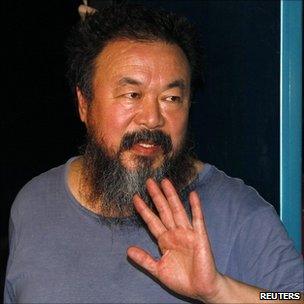China artist Ai Weiwei 'to challenge tax bill and fine'
- Published

Ai Weiwei is prohibited from speaking publicly, but his family denies he dodged taxes
Chinese artist and government critic Ai Weiwei is to challenge a bill of more than 12m yuan ($1.9m, £1.2m) in unpaid taxes and fines, his wife told the BBC.
The demand was made by the authorities just days after he was released from nearly three months in detention.
Mr Ai's lawyer said a request had been made for an administrative review before the tax authorities.
Mr Ai is one of the most prominent figures caught up in a recent crackdown on critics of the Communist Party.
He was released last week after being detained at a secret detention centre for 80 days. His family has insisted he is being targeted for his political activism.
Proof wanted
Beijing's Tax Bureau says Mr Ai owes 4.85m yuan in unpaid taxes, and has insisted he pay an additional fine of 7.3m yuan.
Mr Ai's wife, Lu Qing, told the BBC's Chinese service that a request for a review had been filed with the tax office in Beijing.
Lu Qing is the legal representative of her husband's design company Beijing Fake Cultural Development Ltd.
The appeal demands proof of the alleged tax evasion and a review of the case, said Pu Zhiqiang, a lawyer retained by the design company.
Shortly after Mr Ai's detention, the authorities seized accounting records and other documents that have yet to be returned, which means the company has no way of checking the allegations, Mr Pu said.
Chinese officials say Mr Ai was released after confessing to a failure to pay a "huge amount" of taxes and for destroying financial documents.
The terms of Ai Weiwei's bail prevent him from speaking out publicly, so it has been left to his family to deny that he evaded tax.
They say the tax demand covers the past 10 years, and they want to know why the issues are being raised only now.
Mr Ai's mother has said she believes the artist is being persecuted, because the authorities want to silence him and stop his political activism.
In recent weeks more than 100 other prominent activists, human rights lawyers, and internet bloggers have been targeted in a crackdown launched by China's communist leaders.
Human rights groups say it is the most grave silencing of voices of dissent in China since the Tiananmen massacre more than 20 years ago.
- Published20 July 2012
- Published27 June 2011
- Published31 August 2012